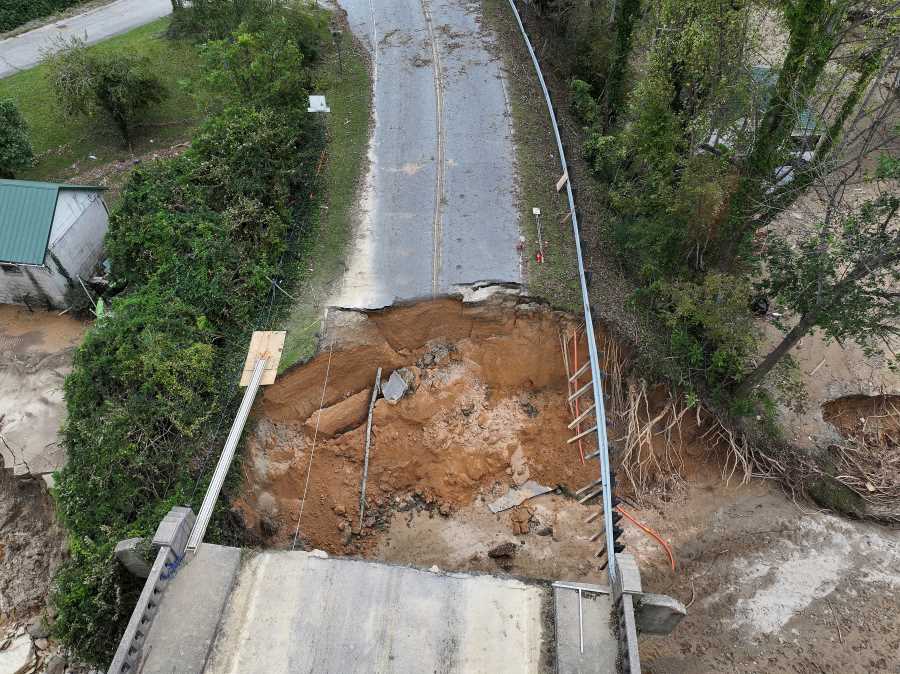
A natural disaster and a potentially catastrophic dockworker strike have highlighted weaknesses in the supply chain. | TajdidProtik/Shutterstock
In the past two weeks, the U.S. East Coast has experienced the double punch of a massive port strike and a devastating hurricane, exacerbating already uncertain market fundamentals. While the dockworker strike was very brief, storm-related destruction in the Southeast will last for weeks – if not months or years.
Even before the dockworker strike, the potential impact was clear around a month ago, according to Chris Goger, senior director of recycling at New Jersey-based brokerage BlackBridge Investments.
“Everyone was confident it was going to happen,” he said. “It was just a matter of how long it was going to last.”
The three-day strike prevented unloading of container ships along the eastern seaboard and the Gulf coast, before the International Longshoremen’s Association workers’ union and port operators reached a tentative deal that suspended the strike. In a joint statement the two groups said they would extend their master contract until Jan. 15, 2025, to return to the bargaining table to negotiate all outstanding issues.
In the weeks leading into the strike, some sellers were proactively looking for more domestic orders to absorb their supply in the event of a prolonged strike, Goger said. And although exports of paper fiber have been dropping, sellers up and down the East Coast may rely on exporting material, especially fiber but also mixed rigid plastics and LDPE film bales, to avoid getting excessive inventory and find the most competitive pricing.
OCC and mixed paper represent the biggest volumes coming out of MRFs, and because they are more vulnerable to weather elements, “they can’t afford to be patient the way you can with certain grades” with disruptions in offtake.
Goger said that given that five to 10 loads go out in a day, even just a few days of missed pickups can create a big problem.
In contrast, plastics and glass can be stored outside if the supplier has the space.
The strike caused apprehension among PET recyclers on the East Coast, said Emily Friedman, senior editor of recycled plastics at commodity price reporting agency ICIS. Some converters import competitively priced RPET flake and as such could be limited to domestic supply, which she said would increase demand pressure and potentially increase prices.
Conversely, lower-quality recovered LDPE film is often exported to India and Southeast Asia, where workers sort through the bales to create higher quality PCR that then is processed and distributed throughout Asia – often to China’s massive plastics industry.
“I think there is a little bit of fear from those players who do trade internationally, what are they going to do with this material,” she said, adding that among sellers of lower-quality post-use LDPE film, there was concern they couldn’t get the bales to buyers.
Another knock-on effect is that with domestic virgin PE largely exported, a dockworker strike would force more resin to remain stateside, pushing prices down and making recycled HDPE less attractive, Friedman said.
Nevertheless, significant disruptions can present opportunities for both suppliers and mills to explore the benefits of long-term contract stability, Goger said.
Contractual arrangements help ensure supply security and limit exposure to pricing risk, whereas spot volumes may go to the highest bidder to maximize profit.
The strike was not the first major event to emphasize the risk involved in overreliance on distant trading partners. Supply chain disruptions during the COVID-19 pandemic and trade wars with China both caused corporate America to focus on nearshoring, or creating supply chain networks closer to domestic demand – for example, locating plants in Latin America rather than in Asia.
Storm recovery
Hurricane Helene hit the southeastern U.S. Sept. 26-27, knocking out power and leaving a path of destruction from northwestern Florida throughout the Appalachian Mountain region. And Hurricane Milton is expected to make landfall on Florida’s western coast on Oct. 9.
During a natural disaster, restoring basic services such as power and water treatment understandably takes priority over trash and recycling collection. And when collection resumes, haulers may prioritize debris removal over curbside recycling.
In addition, the lack of clean drinking water results in a significant increase in post-consumer PET bottles, which may or may not find their way into the recycling stream.
“I think recycling would be the lowest priority of people who are receiving that emergency water,” Friedman said.
Logistics continue to be complex, Friedman and Goger both said, with storm damage making regional transport difficult.
Storm damage occurred throughout eastern Tennessee, and most severely in western North Carolina.
“Long-term closures will be in place across the region as many routes will require significant repairs and for others, a total rebuild,” the Tennessee Department of Transportation said on its hurricane recovery page as of Oct. 4.
In Tennessee’s hard-hit neighbor state, “all roads in Western North Carolina should be considered closed,” according to the North Carolina DOT, adding that the area is experiencing shortages of water, food and gasoline and unreliable power and communication infrastructure.
“Recovery efforts will likely take many months as damage to many roads and bridges is catastrophic,” the DOT said in an Oct. 4 recap.
And although most plants in the region were only mildly affected by brief power outages, with fall being a slower season for the RPET market, some could use this as an opportunity to idle their plants, Friedman said.
On the heels of Helene, Florida now is preparing for Hurricane Milton to make landfall Oct. 9.
Among storm relief efforts are a clothing drive held by Tennessee-based Eastman and Goodwill, and a $100,000 donation from the ILA.
For more information on how to help hurricane relief efforts, visit the Federal Emergency Management Agency website.

